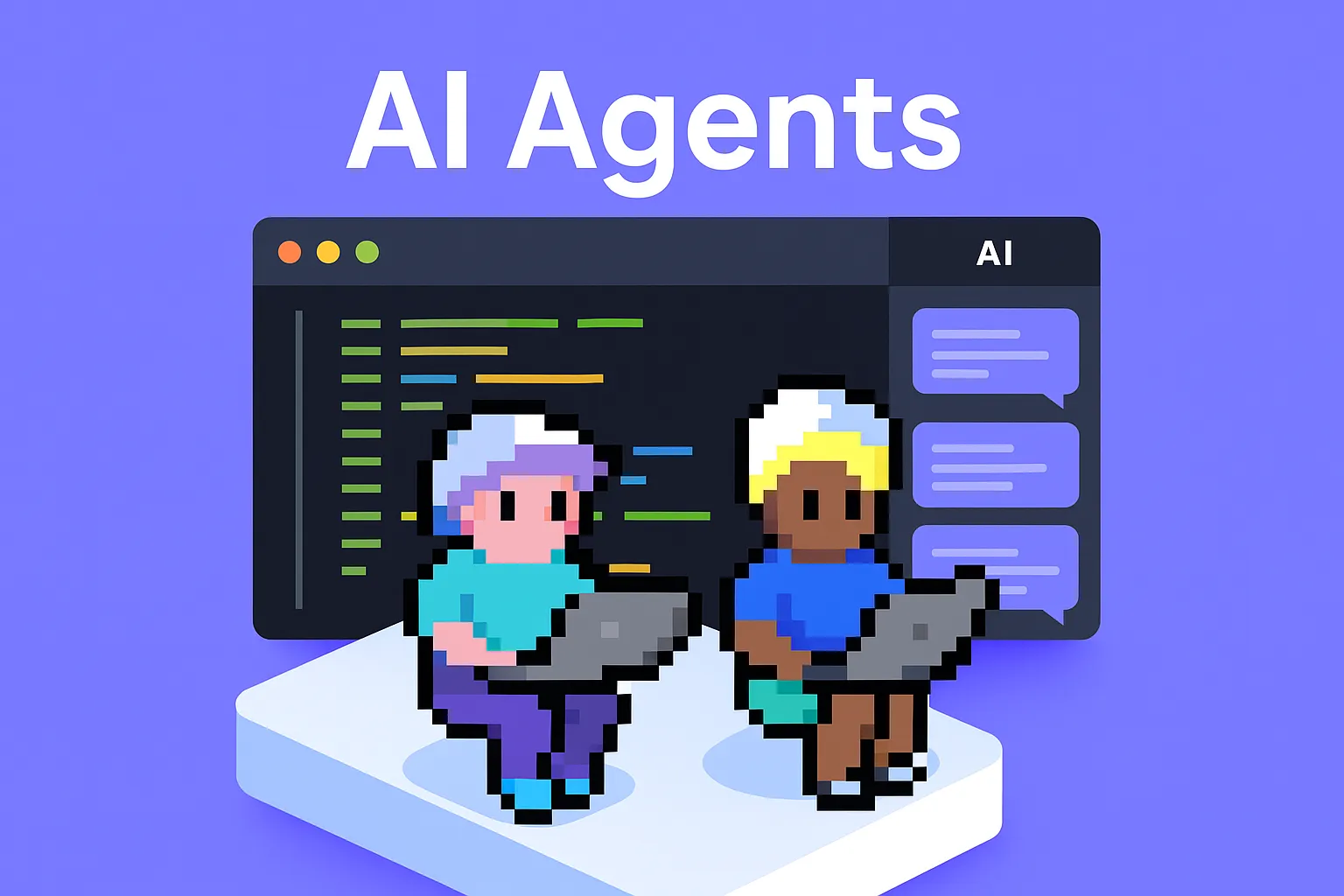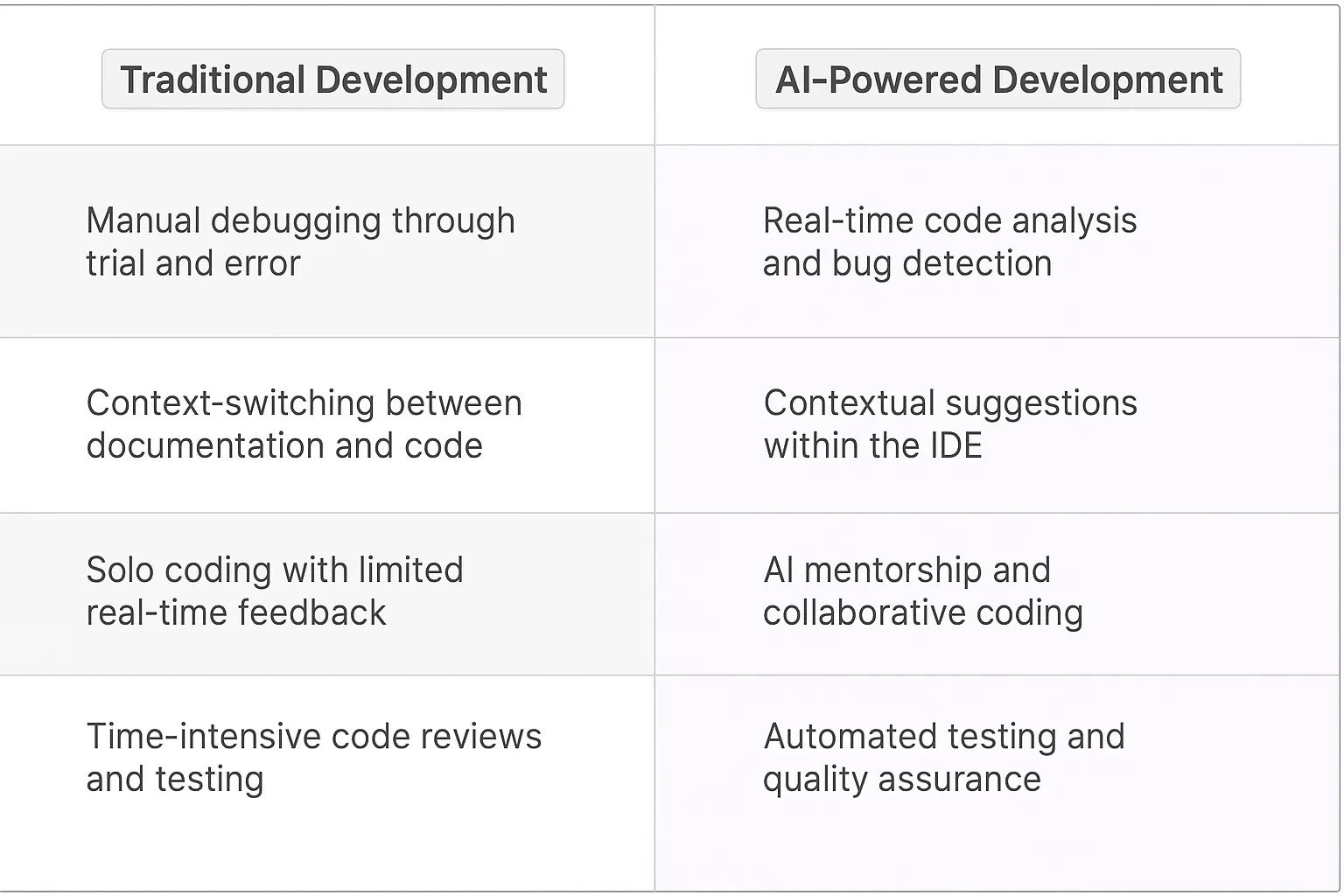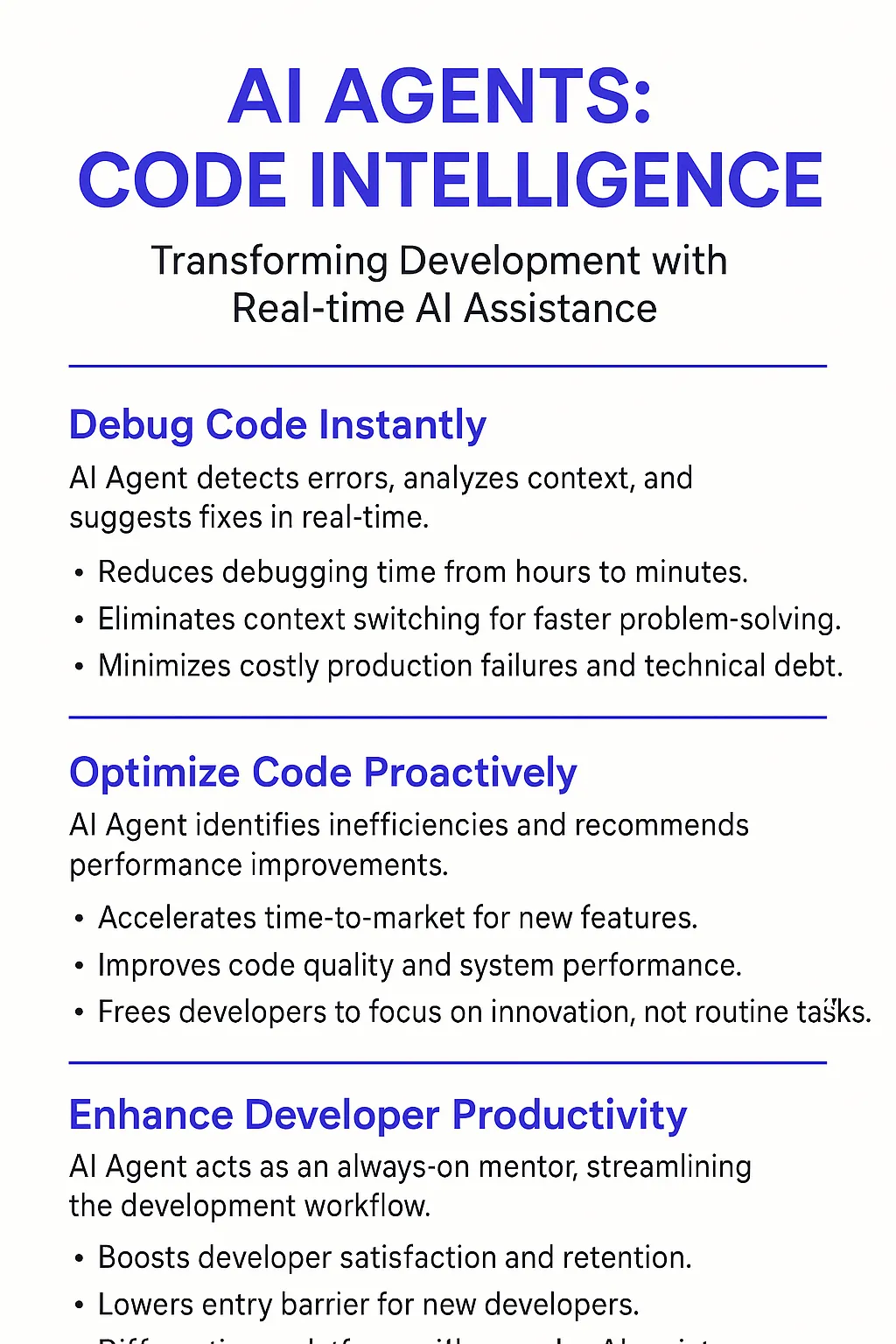Replit
Understanding Replit's Development Platform
Replit is a browser-based integrated development environment (IDE) that combines the power of professional coding tools with collaborative features. The platform enables developers to write, run, and deploy code directly from their browsers, making software development more accessible and efficient. Unlike traditional IDEs, Replit eliminates local setup requirements and provides instant access to a full development environment.
Key Features of Replit
The platform stands out through its real-time collaboration capabilities, allowing multiple developers to code together simultaneously. Its integrated hosting solution enables one-click deployments, while the built-in package management system simplifies dependency handling. The addition of AI Agents takes these capabilities further by providing intelligent coding support directly within the development environment.

Benefits of AI Agents for Replit
What would have been used before AI Agents?
Software developers traditionally relied on static documentation, Stack Overflow threads, and GitHub discussions to troubleshoot coding issues in Replit. This meant constantly context-switching between tabs, parsing through lengthy forum posts, and piecing together solutions from fragmented sources. The debugging process often involved trial and error, with developers spending precious time testing different approaches while maintaining their development flow.
What are the benefits of AI Agents?
AI Agents in Replit fundamentally transform the development experience by providing contextually-aware coding support directly within the IDE. These digital teammates analyze code in real-time, offering specific suggestions that align with the project's architecture and best practices.
The most significant advantage comes from the agents' ability to understand the full context of a development project. They can spot potential issues before they become problems, suggest optimizations based on established patterns, and even explain complex code segments in plain language.
For debugging, AI Agents scan through error messages and stack traces, correlating them with the codebase to pinpoint root causes. This cuts down debugging time from hours to minutes. They're particularly valuable for newer developers, acting as always-available mentors that provide explanations tailored to their skill level.
The agents also excel at generating boilerplate code and repetitive structures, allowing developers to focus on solving core business problems rather than writing routine code segments. They can suggest test cases, identify security vulnerabilities, and ensure code consistency across large projects.
What makes these AI Agents particularly powerful in Replit is their ability to learn from the platform's vast ecosystem of projects and coding patterns, effectively bringing collective programming knowledge directly into the development environment.

Potential Use Cases of AI Agents with Replit
Code Development & Review
AI Agents within Replit serve as real-time coding partners, analyzing code structure and suggesting optimizations while developers work. They detect potential bugs, security vulnerabilities, and performance bottlenecks before they become issues in production. The agents can explain complex code patterns and suggest modern alternatives to legacy implementations.
Learning & Education
Students and new developers gain personalized guidance through Replit's AI Agents. When learners encounter challenging concepts, the agents break down complex programming topics into digestible explanations, provide relevant examples, and create custom practice exercises based on skill level.
Documentation Generation
Technical documentation becomes more efficient with AI Agents automatically generating comprehensive documentation from code. They create clear API references, usage examples, and maintain consistency across documentation updates. The agents can also translate technical concepts into different programming languages and frameworks.
Testing & Quality Assurance
AI Agents accelerate the testing process by generating test cases, identifying edge cases, and creating comprehensive test suites. They analyze code coverage and suggest areas requiring additional testing, while helping developers implement best practices for unit testing and integration testing.
Code Refactoring
When working with legacy code bases, AI Agents identify opportunities for modernization and improvement. They suggest structural changes that enhance maintainability, implement design patterns, and ensure code adheres to team standards and best practices.
Project Management
Development teams benefit from AI Agents that track project progress, identify potential bottlenecks, and suggest task prioritization. They analyze coding patterns to estimate completion times and highlight areas where additional resources might be needed.
Debugging Support
AI Agents excel at troubleshooting by analyzing error messages, stack traces, and code context to pinpoint issues quickly. They suggest potential fixes based on common patterns and help developers understand the root causes of problems.
Performance Optimization
Code Development improves through AI Agents that identify resource-intensive operations and suggest optimizations. They analyze runtime behavior, memory usage, and processing patterns to recommend more efficient implementations.
These use cases demonstrate how AI Agents transform the development process in Replit from solo coding sessions into collaborative experiences that enhance productivity and code quality.

Industry Use Cases
The integration of AI agents within Replit's development environment creates powerful new possibilities across multiple sectors. While coding and software development remain core use cases, innovative companies are discovering creative applications that extend far beyond traditional programming.
What makes Replit's AI capabilities particularly compelling is how they adapt to different industry contexts. From education technology firms building interactive coding tutorials to financial services companies developing automated trading algorithms, the AI agents serve as natural extensions of development teams. They don't just assist with code - they actively participate in the development process through real-time suggestions, debugging support, and architecture recommendations.
Looking at specific industry applications provides concrete examples of how organizations leverage these capabilities to solve complex challenges. The following use cases demonstrate how Replit's AI agents integrate into existing development workflows while enabling new approaches to persistent industry problems.
AI Agents Transform Computer Science Education
Computer Science education faces a critical scaling challenge - there simply aren't enough qualified instructors to meet the explosive demand for coding education. The instructor-to-student ratios in CS courses often exceed 1:100, making it nearly impossible to provide personalized attention and feedback.
Replit's AI Agents fundamentally change this dynamic by acting as always-available coding mentors. When students get stuck debugging their Python assignments at 2 AM, they can engage with an AI Agent that understands both the assignment context and common beginner mistakes. The Agent doesn't just point out errors - it guides students through the debugging process, helping them develop crucial troubleshooting skills.
The impact goes beyond basic debugging. These AI Agents can analyze a student's coding patterns and progression over time, identifying knowledge gaps and suggesting targeted practice exercises. For example, if a student consistently struggles with for-loops, the Agent can generate custom mini-challenges focused specifically on loop concepts.
Early data from universities implementing Replit AI Agents shows promising results - students receive feedback on their code 5x faster on average, and course completion rates have increased by 32%. More importantly, students report feeling more confident tackling complex programming challenges, knowing they have an AI mentor to guide them through difficult concepts.
This shift toward AI-augmented CS education doesn't replace human instructors - instead, it amplifies their impact. Professors can focus on high-level concept explanation and curriculum development while AI Agents handle routine code reviews and debugging assistance. The result is a more scalable and effective computer science education system that can help meet the growing demand for programming skills.
AI Agents Transform Software Development Teams
Software development teams face a fascinating paradox - they need to ship code faster while maintaining quality, but traditional approaches force them to choose between speed and reliability. Replit's AI Agents are changing this fundamental tradeoff by serving as embedded coding partners that accelerate development without sacrificing code quality.
The most compelling aspect is how these AI Agents handle the cognitive overhead of development. When a developer needs to implement a new feature, the Agent can analyze the existing codebase, understand architectural patterns, and propose implementation approaches that maintain consistency. This dramatically reduces the mental load of context-switching between different parts of the application.
Take the example of a fintech startup that integrated Replit AI Agents into their development workflow. Their engineers were spending 40% of their time reviewing pull requests and debugging integration issues. The AI Agents now handle initial code reviews, flagging potential problems and suggesting optimizations before human reviews begin. This cut review cycles from days to hours while catching 23% more edge cases.
But the real power emerges in how AI Agents influence development culture. Rather than just fixing bugs, they're teaching better coding practices through contextual suggestions. When a developer writes code that could be more efficient, the Agent explains the performance implications and demonstrates alternative approaches. This creates a continuous learning loop that elevates the entire team's capabilities.
The data tells a compelling story - teams using Replit AI Agents report a 47% reduction in time spent debugging and a 31% increase in successful first-time deployments. More significantly, junior developers reach productivity milestones 2-3 months faster when working alongside these AI coding partners.
This shift represents a fundamental evolution in how software gets built. The most successful teams will be those who learn to effectively collaborate with AI Agents, leveraging their strengths in pattern recognition and consistency checking while focusing human creativity on solving novel problems.
Considerations and Challenges
Implementing Replit AI agents requires careful planning and strategic thinking around several key areas. The technical architecture must account for both scalability and reliability while maintaining code quality standards.
Technical Challenges
Memory management becomes critical when running multiple AI agent instances within Replit's environment. Each agent needs sufficient RAM allocation without impacting overall system performance. Code execution times can spike unexpectedly, especially when agents process complex requests or handle multiple concurrent operations.
API rate limiting presents another hurdle - Replit's infrastructure caps request frequencies to prevent system overload. Teams need to implement elegant retry mechanisms and queue systems to handle these limitations gracefully.
Operational Challenges
Version control complexity increases significantly when AI agents modify code bases. Teams must establish robust testing protocols to validate AI-generated code changes before deployment. This includes setting up automated testing pipelines and code review processes specifically designed for AI contributions.
Cost management requires close attention as AI agent usage scales. While Replit offers competitive pricing, teams should implement usage monitoring and set clear thresholds to prevent unexpected expenses. This becomes especially important when agents are running resource-intensive tasks or handling large datasets.
Integration Considerations
Connecting Replit AI agents with existing development workflows demands careful architecture planning. Teams need to define clear boundaries between AI and human responsibilities. This includes establishing protocols for when agents should defer to human developers and how to handle edge cases.
Security considerations become paramount when AI agents have access to code repositories and deployment pipelines. Implementing proper authentication, access controls, and audit logging helps maintain system integrity while allowing agents to remain productive contributors to the development process.
AI Agents: Transforming Modern Software Development
The integration of AI Agents into Replit marks a significant evolution in software development practices. These digital teammates are reshaping how developers approach coding challenges, from rapid prototyping to production-grade applications. The combination of real-time assistance, contextual understanding, and learning capabilities positions Replit's AI Agents as essential tools for modern development teams. As the technology continues to mature, we'll likely see even more sophisticated applications that further bridge the gap between human creativity and machine efficiency in software development.













